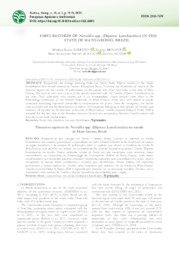First records of Neosilba spp. (Diptera: Lonchaeidae) in the state of Mato Grosso, Brazil.
First records of Neosilba spp. (Diptera: Lonchaeidae) in the state of Mato Grosso, Brazil.
Author(s): BARRETO, M. R.; BEN-HUR, R.; SOUSA, M. do S. M. de; ADAIME, R.
Summary: Responsible for damage infesting fruits and flower buds, Diptera species of the family Lonchaeidae have caused concern to farmers throughout Brazil. Knowing the abundance of insects in the Amazon region and the scarcity of publications on the species that affect fruit trees in the state of Mato Grosso, this work to carry out a survey of the species associated with the Neosilba (Diptera: Lonchaeidae) in the state. Fruit collections were carried out in six municipalities, whose samples were taken to the Entomology Laboratory of the Federal University of Mato Grosso, where they were placed in plastic containers containing expanded vermiculite to accommodate the pupae. After the emergency, the insects were sacrificed and sent for identification. A total of 163 specimens belonging to four species of Neosilba were obtained, all reported for the first time in the state of Mato Grosso. Neosilba inesperata Strikis & Prado, 2009 is reported for the first time in the Brazilian Amazon. Several new associations between Neosilba species and host plants are made for the region.
Publication year: 2023
Types of publication: Journal article
Unit: Embrapa Amapá
Keywords: Amazônia meridional, Distribuição, Lonqueídeos, Praga de Planta, Tephritoidea
Observation
Some of Embrapa's publications are published as ePub files. To read them, use or download one of the following free software options to your computer or mobile device. Android: Google Play Books; IOS: iBooks; Windows and Linux: Calibre.
Access other publications
Access the Agricultural Research Database (BDPA) to consult Embrapa's full library collection and records.
Visit Embrapa Bookstore to purchase books and other publications sold by Embrapa.

